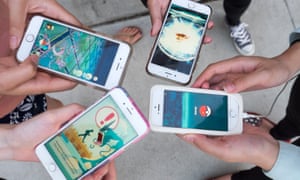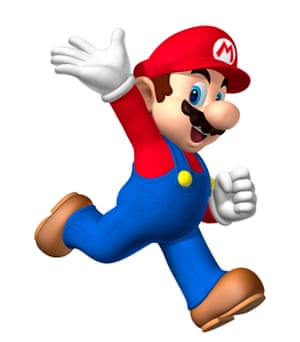Purchases on its software platform made $8.6bn for the company last year, even as demand for the iPhone showed signs of easing

Pokémon Go players in California at the height of the game’s popularity last summe
When Apple launched its App Store eight years ago with a selection of just 500 applications for iPhone users, not many of the company’s famously bullish executives could have expected that it would grow into an earnings juggernaut. The iPhone and iPod were overwhelming successes and the iPad was just around the corner: apps seemed like an offshoot.
But last year, Apple’s app business made almost $30bn (£24bn) as the Pokémon Go phenomenon drove purchases, taking total store sales to $85bn since 2008. This week’s latest quarterly results will confirm its importance to the tech group, with iPhone sales losing steam and the group’s services unit – home to the app store and iTunes – becoming increasingly important to Apple.
Matti Littunen, a tech expert at Enders Analysis, says the iPhone remains the cornerstone of the business, accounting for well over 60% of revenue, but the store is a key part of Apple’s strategy to make more money away from hardware.
“The App Store business is of growing importance to Apple,” says Littunen. “Following the decline in iPhone sales, the services division is becoming more important. Apple needs to do everything it can to make sure it has the best services available and top developers on board.”
But it is not just Apple and its investors that benefit from the store. App developers keep the majority of the income. Last year, the $28.6bn earned by the store was split between developers, who took home $20bn, and Apple, which pocketed $8.6bn from its 30% cut.
Peter Molyneux, a renowned British video game designer, says that the arrival of Apple’s store and Google’s rival service, Play, has represented a revolution for games and product developers.
Molyneux says one of his first hits, Fable, took seven years to sell 10m copies after it was launched in 2004. The latest game produced by his 22cans studio, The Trail, passed that total within a matter of months thanks to the store. “In November we launched The Trail and it has passed 10 million downloads already. More people are interacting with one game I release now than almost the entirety of the games I made when doing so for consoles. The fascinating thing about the app economy is you can create a game, or an app, that reaches the entire world.”
Growth in earnings from the App Store shows no sign of slowing down. Revenues are rising 40% year-on-year, while in China, where Google does not operate a rival service, they are growing at 90%. It is little wonder that Apple thanked developers recently while gently reminding them that “our products” – an ecosystem of phones, tablets and the store itself – make it all possible.
In the first quarter of last year, sales of the iPhone suffered their first ever decline, leading some analysts to speculate that the world may have reached “peak Apple” and prompting the company to ensure its content operation continues to run like clockwork.
Last year Apple improved its terms by giving developers 85% of subscription revenue, but only after a subscriber uses the app for at least a year. Otherwise, one-off purchases in apps, such as when a gamer pays to open new levels or buys items to help them succeed, remain levied at 70/30.
Littunen believes Apple will relax its policies further following embarrassments that saw Nintendo’s Super Mario Run listed as free, but then charging players $9.99 after a few levels. Spotify also drew criticism for charging $3 more for a subscription through the App Store in order to account for Apple taking its cut.

Super Mario Run was free to download, but charges users $9.99 after playing a few levels.
Despite these setbacks, consumers using apps to subscribe to services such as Netflix are proving to be a real moneyspinner, up 74% year-on-year to $2.7bn in 2016. This has seen subscription services start to appear on Apple’s biggest earner lists, which are usually dominated by “freemium” games. This is where a user can play part of a game for free, but then has to pay to be able to continue effectively.
“There is no question that in-app subscriptions were behind much of the impressive App Store numbers,” says Littunen. “Apps like Netflix, Spotify and Tinder [are] finally able to compete with games on the top-grossing charts.”
Apple is also making a major push into apps for businesses, otherwise known as enterprise apps. Last year, Apple chief Tim Cook announced a deal with Deloitte to develop apps that help companies go about day-to-day business.
The growing importance of this sector was underlined last week when Cisco swooped on AppDynamics, which improves the performance of apps, in a $3.7bn deal.
While Apple does not make money directly from the likes of Uber, Ladbrokes or HSBC having apps on its phones, it wants to ensure it is integral to businesses’ digital strategies as employees and consumers increasingly go mobile.
Horace Dediu at Asymco, a mobile technology consultancy, estimates that companies generate around $300bn from business that is linked to having an app in Apple’s ecosystem.
Mike Anderson, founder of London-based consultancy the Chelsea AppsFactory, cites claims by analysts that the next $1bn-plus hit will not be a Snapchat-style consumer app, but something targeted at the business world. “The first clients we would see would say ‘I’ve got £5,000 and an idea I’m going to be the next Instagram or WhatsApp’. That is a hit-and-miss game. Now we see businesses saying they must have that kind of digital experience to make it as a business. As more and more businesses see examples in the market, you will see a tsunami of demand in the enterprise space. It has moved from ‘nice to have’ to being a business-critical tool.”
Anderson, who has clients including KPMG, Network Rail and Standard Life, cites the example of bookmaker Ladbrokes, which has gone from 30% of digital revenues coming from mobile products to 80%.
While consumers tend to know what business-related apps they want, games publishers are increasingly concerned that the crowded App Store may be good for Apple’s coffers but is making it tough for developers. The number of apps in the App Store grew by a fifth last year to 2.2m, and Apple controls which ones it wants to promote on the home page, which Molyneux says can make or break an app.
“The downside is there are an enormous number of apps being released every day,” he says. “The issue becomes one of discovery: that is the real challenge at the moment. That is where the platform holders really have incredible power – the storefront page.”
Earlier this month, Apple flexed its muscles by raising prices on the UK App Store almost 25% to counter the depreciation of the pound after the Brexit vote. With such power, and with an effective duopoly in the app market, is there cause for concern over market control?
“I don’t think it is any more worrying than, say, dominance in the [high street] retail sector, especially for games, which comes down to just a few main players like Walmart and Tesco,” says Molyneux. “This is just a digital version of that. When you have a limited number of players as gatekeepers, that can always be slightly worrying.”
THE UK’S BIGGEST APPS
Top 10 grossing apps in UK
1. 8 Ball Pool (game)
2. Tinder (dating)
3. Candy Crush Saga (game)
4. Clash Royale (game)
5. Spotify (music)
6. Clash of Clans (game)
7. Episode - Choose your story (game)
8. Netflix (video)
9. Game of War: Fire Age (game)
10. Mobile Strike (game)
1. 8 Ball Pool (game)
2. Tinder (dating)
3. Candy Crush Saga (game)
4. Clash Royale (game)
5. Spotify (music)
6. Clash of Clans (game)
7. Episode - Choose your story (game)
8. Netflix (video)
9. Game of War: Fire Age (game)
10. Mobile Strike (game)
Top 10 paid apps in the UK
1. Official DVLA Theory Test Kit (£4.99)
2. Hitman Sniper (£0.99)
3. 7-Minute Workout Challenge (£2.99)
4. Minecraft: Pocket Edition (£6.99)
5. Football Manager Mobile 2017 (£8.99)
6. Theory Test for Car Drivers (£2.99)
7. The Chase (£1.99)
8. Plague Inc (£0.99)
9. Bloons Tower Defense 5 (£2.99)
10. Scanner for Me (£4.99)
1. Official DVLA Theory Test Kit (£4.99)
2. Hitman Sniper (£0.99)
3. 7-Minute Workout Challenge (£2.99)
4. Minecraft: Pocket Edition (£6.99)
5. Football Manager Mobile 2017 (£8.99)
6. Theory Test for Car Drivers (£2.99)
7. The Chase (£1.99)
8. Plague Inc (£0.99)
9. Bloons Tower Defense 5 (£2.99)
10. Scanner for Me (£4.99)
Source: App Annie
No comments:
Post a Comment